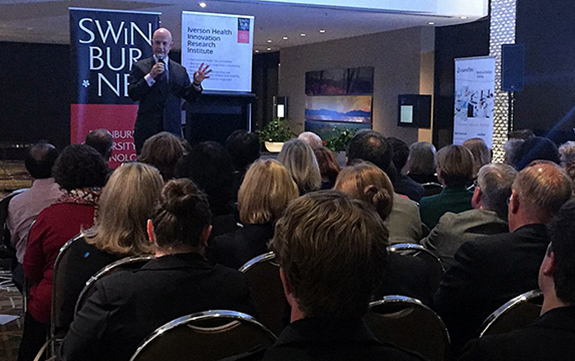New institute pursues innovation in health

In Summary
- The Iverson Health Innovation Research Institute will focus on delivering innovative technology-assisted health outcomes
- New biomedical devices, bioengineering solutions, and digital health initiatives will be central
The Iverson will focus on delivering innovative technology-assisted outcomes to minimise the impact of chronic disease on patients, the health care system and society.
Swinburne University of Technology today launched the Iverson Health Innovation Research Institute (The Iverson) to tackle the health challenges of the 21st century.
The Institute is named after internationally acclaimed researcher in health and medical sciences, the late Professor Don Iverson, who was the inaugural Executive Dean of Swinburne’s Faculty of Health, Arts and Design.
“The Australian healthcare system is under significant strain from our ageing population and the increasing burden of chronic diseases such as cardiovascular disease, diabetes, mental health and cancer,” says Swinburne Deputy Vice-Chancellor Research and Development, Professor Aleksandar Subic.
“The Iverson will focus on delivering innovative technology-assisted outcomes to minimise the impact of chronic disease on patients, the health care system and society.”
New biomedical devices, bioengineering solutions, and digital health initiatives will be central to the armoury of The Iverson in its pursuit of health innovation.
Partnering with industry and medical research organisations
The institute will bring together the best expertise across a wide range of disciplines within Swinburne to work in partnership with industry and medical research organisations to deliver translational research outcomes that create impact.
“Our focus is broad and may include investigations in mental health, acute and chronic disease, developmental and degenerative conditions, ageing and disability,” says inaugural Institute Director, Professor Gavin Lambert.
“While new approaches to diagnose and treat illness are continuously being proposed, the challenge remains to develop citizen-centric healthcare, and to facilitate effective personalised treatments while reducing duplication of resources."
The institute aims to improve diagnosis, treatment and outcomes, enhance quality of life and develop health care efficiencies.
The institute was launched at the AusMedTech medical technology conference at the Crown Conference Centre, Melbourne.

